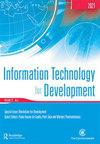远程中心对南非农村地区妇女赋权的贡献
IF 5.1
3区 管理学
Q1 DEVELOPMENT STUDIES
引用次数: 3
摘要
摘要建立电信中心模式是为了提供信息和通信技术(ICT)技能,以增强人们的能力,减少贫困地区的贫困和失业。我们的研究探讨了电视中心作为赋予妇女权力的理想机制的相关性。我们的研究通过分析南非西开普省农村地区的五个电视中心,调查了电视中心如何有助于增强妇女权能。采用定性方法,使用半结构化的深入访谈、焦点小组讨论和参与者观察,从39名参与者中收集数据。赋权理论的维度被用来描述各种赋权结果。其中包括经济、社会、信息、政治和文化赋权。调查结果显示,阻碍妇女利用电信中心的障碍包括缺乏计算机技能、教育、语言障碍、性别使用模式、失业和缺乏意识。我们的研究有助于ICT4D/HCI性别领域,并建议信息和通信技术决策者考虑利用电信中心增强妇女权能。本文章由计算机程序翻译,如有差异,请以英文原文为准。
Telecentres’ contribution to women's empowerment in rural areas of South Africa
ABSTRACT The telecentre model was established to provide information and communication technology (ICT) skills to empower people, reduce poverty and unemployment in poor areas. Our study explored the relevance of telecentres as an ideal mechanism to empower women. Our study investigated how telecentres can contribute to women’s empowerment by analysing five telecentres in rural settings of the Western Cape, South Africa. A qualitative approach was adopted using semi-structured in-depth interviews, focus group discussions, and participant observation to collect data from 39 participants. The Dimensions of Empowerment Theory was used to describe the various empowerment outcomes. These include economic, social, informational, political, and cultural empowerment. The findings showed barriers hindering women’s utilization of telecentres included a lack of computer skills, education, language barriers, gender usage patterns, unemployment, and a lack of awareness. Our study contributes to the ICT4D/HCI gender field and suggests that ICT policymakers consider using telecentres for women empowerment.
求助全文
通过发布文献求助,成功后即可免费获取论文全文。
去求助
来源期刊

Information Technology for Development
Multiple-
CiteScore
11.30
自引率
16.70%
发文量
34
期刊介绍:
Information Technology for Development , with an established record for publishing quality research and influencing practice, is the first journal to have explicitly addressed global information technology issues and opportunities. It publishes social and technical research on the effects of Information Technology (IT) on economic, social and human development. The objective of the Journal is to provide a forum for policy-makers, practitioners, and academics to discuss strategies and best practices, tools and techniques for ascertaining the effects of IT infrastructures in government, civil societies and the private sector, and theories and frameworks that explain the effects of IT on development. The concept of development relates to social, economic and human outcomes from the implementation of Information and Communication Technology (ICT) tools, technologies, and infrastructures. In addition to being a valuable publication in the field of information systems, Information Technology for Development is also cited in fields such as public administration, economics, and international development and business, and has a particularly large readership in international agencies connected to the Commonwealth Secretariat, United Nations, and World Bank.
 求助内容:
求助内容: 应助结果提醒方式:
应助结果提醒方式:


